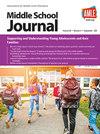Reading intervention in middle schools: Challenges and suggested approaches
Q3 Social Sciences
引用次数: 0
Abstract
AbstractMiddle schools implementing a multi-tiered system of supports will provide adolescents with or at risk for reading difficulties supplemental, small-group reading intervention classes. Although numerous studies have established that peer collaboration, blended learning, differentiation, and sufficient time for instruction are effective practices for improving reading outcomes among middle school intervention students, educators still experience challenges to implementing these recommended approaches. This article offers research-based guidance intended to support the provision of literacy interventions that can meet middle school students’ academic and developmental needs. After summarizing several challenges that were identified during a semester-long study of implementing a supplemental reading intervention class for Grade 7 students, guidance and tools or examples are provided for achieving a more successful implementation of each practice and promoting learning that is active, purposeful, relevant, and democratic.Keywords: Blended learningdifferentiationinstructional timeliteracy interventionmiddle schoolpeer collaboration Disclosure statementNo potential conflict of interest was reported by the author(s).Additional informationFundingThe research reported here was supported by the Institute of Education Sciences, U.S. Department of Education, through Grant [#R324A220269] to the University of Tennessee. The opinions expressed are those of the authors and do not represent views of the Institute or the U.S. Department of Education.Notes on contributorsDeborah K. ReedDeborah K. Reed, PhD, is a Professor and the Director of the Tennessee Reading Research Center at the University of Tennessee, Knoxville. Email: dreed20@utk.edu.中学阅读干预:挑战与建议方法
摘要实施多层次支持体系的中学将为有阅读困难或有阅读困难风险的青少年提供辅助性、小团体阅读干预班。尽管许多研究已经证实,同伴合作、混合式学习、区分和充足的教学时间是提高中学干预学生阅读效果的有效做法,但教育工作者在实施这些推荐方法时仍然面临挑战。本文提供了基于研究的指导,旨在支持提供能够满足中学生学业和发展需求的扫盲干预措施。在总结了在七年级学生实施辅助阅读干预课程的一学期研究中发现的几个挑战之后,本文提供了指导和工具或示例,以实现更成功地实施每项实践,并促进积极、有目的、相关和民主的学习。关键词:混合式学习差异教学时间素养干预中学生同伴合作披露声明作者未报告潜在的利益冲突。本研究报告由美国教育部教育科学研究所通过资助田纳西大学资助。所表达的观点是作者的观点,不代表研究所或美国教育部的观点。作者简介德博拉·k·里德德博拉·k·里德博士是诺克斯维尔田纳西大学田纳西阅读研究中心的教授和主任。电子邮件:dreed20@utk.edu。
本文章由计算机程序翻译,如有差异,请以英文原文为准。
求助全文
约1分钟内获得全文
求助全文

 求助内容:
求助内容: 应助结果提醒方式:
应助结果提醒方式:


